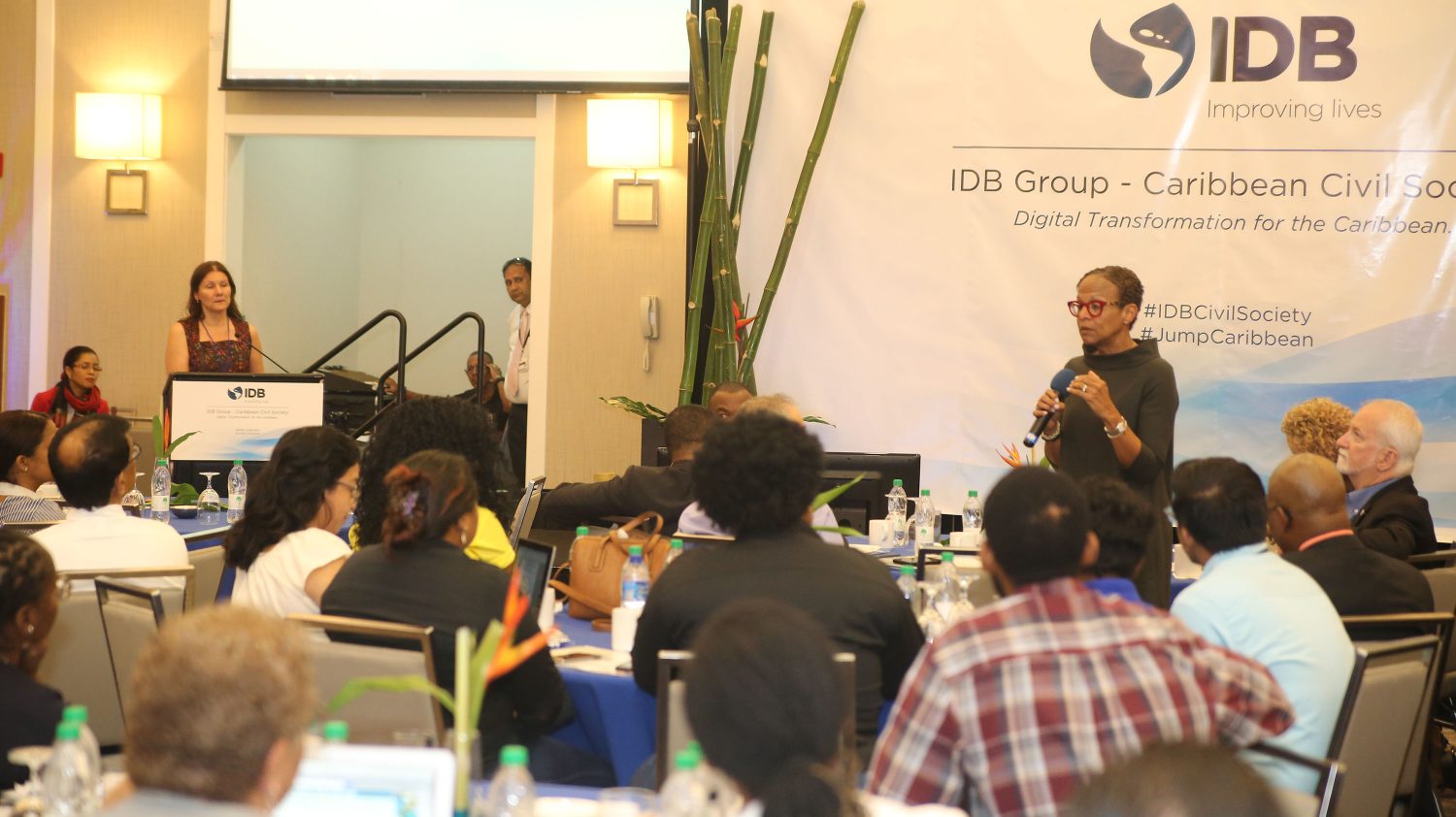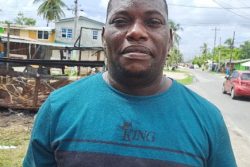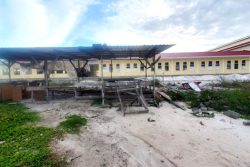With assistance and support from the Inter-American Development Bank (IDB), along with civil society collaboration, the Government of Guyana is optimistic that by 2020, Guyanese will be able to access at least 200 services online.
Minister of Public Telecommunications Catherine Hughes told attendees at the IDB’s 8th annual Caribbean Civil Society Meeting on Friday that Guyana is moving towards “creating a 21st century government where more services can be provided online”, and that it is hoped that by 2020, “more than 200 of those services will be provided online with both “speed and efficiency.”
The Minister’s statement had followed an anecdotal example of an investor wanting to establish an agricultural export business here, but having to run around to at least 10 government agencies for documentation to have the process started. “…Technology can change all this…,” she stated. “That’s why we have started by focusing on building our telecommunication infrastructure and improving internet access; that is, connecting government ministries and offices, high schools, NDC and RDC offices, hospitals, health centres, police stations…,” Hughes added.
On Friday, over 150 civil society representatives formed part of an interactive all day session held at the Marriott Hotel, Georgetown, under the theme ‘Digital Transformation for the Caribbean.’ They heard from presenters how technology and innovation are improving people’s lives and how this can be emulated in their respective homelands.
The IDB said that the objectives of the dialogue were to “provide Carib-bean Civil Society organizations, including those that are members of the IDB’s Civil Society Consulting Groups (ConSOCs), an opportunity to exchange good practices and lessons learned on how the Caribbean can adapt to the new dynamics of the digital economy and exponential growth; and explore potential areas for future partnerships between the bank and civil society to adopt innovative development solutions for the region.”
Key topics covered included digital transformation and industries for the future, digital transformation and natural disasters, the use of innovative technology and data to assess the impact of sea level rise and coastal flooding in the Caribbean, and the role civil society has in promoting a digital economy.
STEM Guyana’s co-founder Karen Abrams delivered a presentation which enthralled the audience. While her presentation focused on robots made in the Caribbean, she also showcased robots built by Guyanese youth.
The multilateral bank’s General Manager and Country Representative of Jamaica Therese Turner-Jones echoed the objectives of the forum in an interview with this newspaper but expounded on how it can benefit the Caribbean region, and especially Guyana, where many of the residents live in remote areas.
“This digital agenda for us is a very important exercise because the Caribbean has been left behind in terms of technological use and adaptation. If you look at countries around the world that are growing faster than others, the difference is how they are using technology—how fast their firms are using it…it is not just technology for technology sake. It’s trying to get how the public sector interacts better with its citizens… how can I pay my taxes more easily? Can I pay my taxes online? If I can’t, then I have to take time off of my job, go stand in line to pay my taxes. The government needs my revenue but can’t find any efficient ways for me to deliver that,” she said.
“We talked about agriculture… there is so much… knowledge that is available across so many sectors that we don’t need to be groping in the dark. A lot of knowledge is available from experiences around the world and we just need to pick the ones that can help us with complex challenges,” she added.
Minister Hughes told this newspaper that government worked closely with the IDB in the planning and organization of the event and that government officials and Cabinet were able to meet with the team to discuss how technology can be used to improve the lives of Guyana’s populace.
“They had meetings with heads of government agencies and then something with Cabinet yesterday [Thursday] also. I think this stakeholders’ meeting was awesome because it was able to [bring] Guyanese and our visitors up-to-date on exponential technologies and show what is happening in the world, in terms of technology and not only that, but the rapid pace [with which it is developing],” she said.
“We can’t begin to imagine what the world would look in five years’ time, more so in in 20 years’ time and yet from a public sector standpoint we have to plan. We have to have a vision…where we [want] to be and also how we will be able to get there. Technology is a great equalizer, it allows us to jump so many steps and gives us an opportunity to learn from other countries what they have done,” she added.
She noted that the forum allowed people to see how Guyana could incorporate different aspects of technology into the different industries
“For example: How do we use technology in agriculture? We learned about places that are delivering medicines by drones, what [are] the possibilities of doing that in Guyana? How much money we would save as opposed to sending vehicles into the remote communities? There are huge cost benefits. It has opened our minds and I am absolutely excited. It is trying to get Guyanese where we are planning to and are heading and getting the buy in, [that is] getting more and being a digital country and economy,” she added.
Hughes said that her government is not interested in maintaining the “development status quo” but seeks real transformation and knows that this cannot be achieved from mere incremental growth but requires exponential thinking.
“We had an interesting conversation yesterday with Dr. [Nicholas] Haan [Vice President of Impact at think thank Singularity University] regarding the rapid pace of technological advancements and how we must start to think differently and outside of the traditional box…We must recognize the possibilities for development if we strike our own path starting with deciding, choosing that one area of endeavor in which Guyana can lead the world. Be number one. Imagine it could be the ‘robotics in agriculture’ capital of the world,” she said.
“Many countries, especially in the east, have changed their fortunes over a very short time span, and now they are exporting ICT [Information and Communication Technology] equipment, ICT services as well as their human capital, and earning revenue for their national coffers. There is absolutely no reason why Guyana cannot reach that pinnacle in the foreseeable future. I’ve said all this to demonstrate that there is tremendous space for collaboration and partnership between the public and private sectors. We should be able to grow together, share our skills, resources, insights and experiences,” she added.
Civil Society member and software engineer Mark Alli told this newspaper that the event was a tremendous opportunity for him to gain exposure not only personally but by hearing and seeing examples first hand of how technology is used to help positively transform other countries.
“This has helped in a multitude of ways because first there is the exposure to what is happening. We see what countries from afar are doing and there was a presenter from Estonia that showed their models. It gives you insight into what is happening and how we can work to also have a place on that map of technological advancements,” he said, before adding that Caribbean countries could “maximize technologies” and use the knowledge to leapfrog their development.








